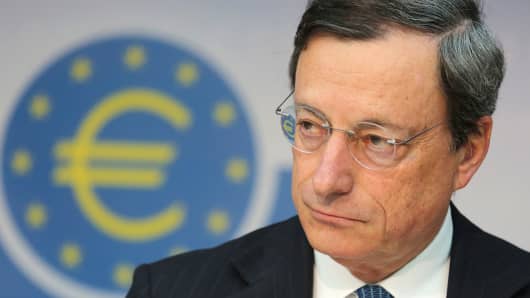Mario Draghi, the President of the European Central Bank (ECB), is focusing on one of the most important aspects of his job Wednesday – keeping Germany onside.
Draghi has a list of German concerns about recent ECB actions to address in Wednesday's visit to the Bundestag, the German parliament. The briefing of the budget, finance and European affairs committees of the Bundestag begins at 12.45 London time, with a subsequent press conference by Draghi at around 3pm.
German politicians are divided about what is most worrying the population.
"The main concern of the German population is inflation," Steffen Kampeter, the German deputy Finance Minister, told CNBC Wednesday. He sees no impact on medium to long-term inflation from planned ECB action, including a planned mass bond-buying program aimed at keeping the borrowing costs of struggling euro zone economies down. Yet inflation can result from liquidity injections.
Germany is the euro zone's biggest economy and has survived the euro zone crisis relatively unscathed. Any sign of weakness in its economy – such as Wednesday's worse-than-expected PMI manufacturing and IFO business sentiment figures – can cause alarm. Concerns that its Constitutional Court might uphold a challenge to the bailout fund, the European Stability Mechanism (ESM), helped dampen markets over the summer.
(Read More: Why Euro Zone Asks for the Bill in German)
"We have to communicate that we have no doubt in the trustfulness of the ECB action," Kampeter said.
"The markets have been calming down and the economic perspective is positive. This is a signal of economic stability being created."
There are also concerns about the ECB's transparency and the movement of powers to institutions which aren't democratically accountable, Gerhard Schick of The Greens, a member of the Bundestag's budget committee, told CNBC.
"There has been a lack of accountability from the ECB in its new role as crisis manager," he said.
"It does not really have a clear direction. They're compromising between their monetary and fiscal policy role. I'm not criticizing the ECB for that, but the governments for not stepping in with crisis management."
"Many competencies are shifting away from national governments and getting lost to institutions not controlled by democracy, so we have to make sure that democracy is not a victim of this crisis," he added.
(Read More: Juergen Stark Argues ECB Has Overstepped Mandate)
Schick also wants more transparency from the troika of international lenders, including the ECB, International Monetary Fund and European Commission, on their negotiations with bailed-out countries.
Latest reports suggest that the troika is preparing to grant Greece more time to get its public deficit under control.
Kampeter advised ECB policymakers to keep discussion within the ECB rather than in the media and to "keep things calm."
He was optimistic about the prospects for the euro zone crisis and claimed that the fiscal policy has moved two years faster "than any observer would have expected us to" with the creation of bailout fund the European Stability Mechanism and movement on future shape of currency union.
Chancellor Angela Merkel's government is facing elections next year, but Kampeter insisted that she is far from a lame duck and that German politicians are broadly supportive of the euro zone stabilization process.
"We are doing our job. Angela Merkel is working hard and tough," he said.
Written by Catherine Boyle, CNBC. Twitter: @cboylecnbc.





